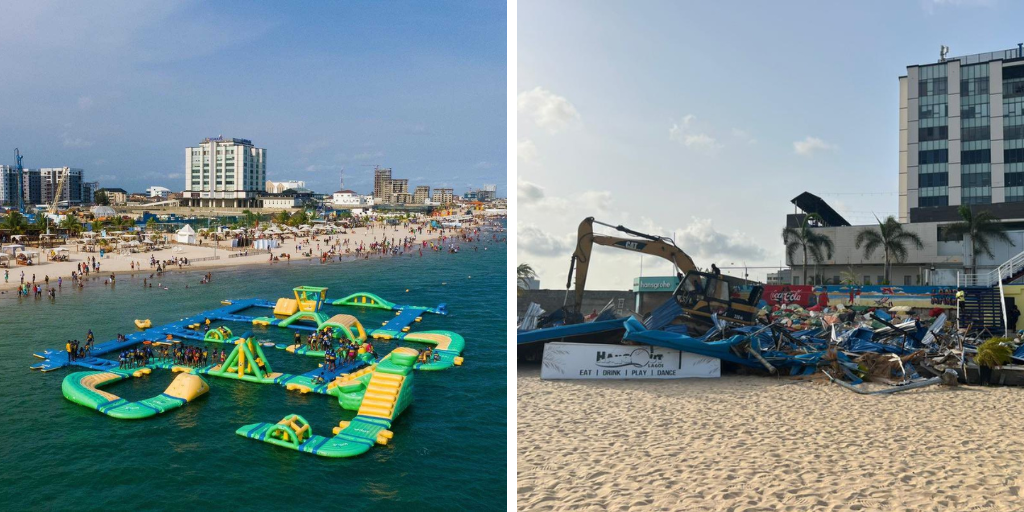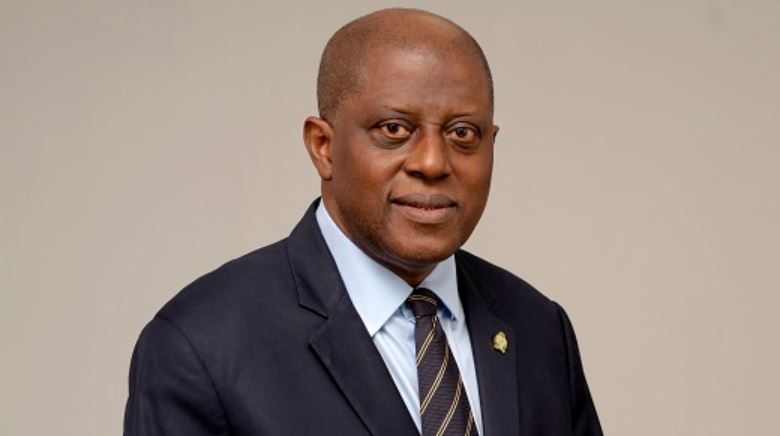When parts of the Landmark beach property were demolished on April 30, 2024, to make way for the Federal Government’s Lagos-Calabar highway project, it meant the end of various businesses within the Landmark ecosystem.
So, we asked one affected business owner to talk about what it’s like to lose their business to an event they couldn’t control.
As told to Toheeb.
Destruction is easy.
I saw this first-hand when the bulldozers came on Tuesday. I watched them tear down the businesses I saw people build in the past years — including the business I built for over three years. It took an hour, and none of these existed anymore. It was a cruel sight; the hardest thing I’ve watched in my adult life.
See, I’ve done businesses in the past that didn’t work out, but none took this kind of hit. I started as an architect and worked in construction for a decade before my interests tilted more towards hospitality. I also had a food business — a grill service — on the side, and in 2021, I brought my industry knowledge to Landmark. Before that time, I operated at the University of Lagos and had a brief spell in Ikeja.
Landmark was different from the other locations where I set up a business. For starters, I didn’t have to pay a year upfront. For most businesses in the Landmark ecosystem, it was not the typical rental system; the arrangement was a partnership where Landmark provided the infrastructure, while the business provided a service, and both parties split the revenue. The ecosystem allowed and encouraged Small and Medium Enterprises (SMEs) to grow at an unbelievable rate.
Add that to the guaranteed footfall. When you have a business outside the ecosystem, you’re thinking about how to get people to your spot. At Landmark, however, the only thing you’d worry about was how to cater to the people there. The market — your customers — were already there, and you just needed to plug in. It was a win-win situation.
Besides the chances of building a profitable business within the ecosystem, Landmark also felt like home; a safe space. I don’t know how best to say this, but being by the water for most of the day was therapeutic. And it went both ways for the business owners and the customers.I was running a business in a place that calmed me and where people were happy to be. The energy was always electric.
But you can’t have everything for long.
In March 2024, the first sets of whispers started. The government had issued a demolition order. Then, the whispers began to spread. I’ll be honest: I’ve known about the coastal road project since late 2021. And I thought — and still think — it’s a wonderful idea. But like everyone else, I thought the road would pass through Water Corporation Road as we had been informed.
We were excited about the additional foot traffic it could mean for Landmark. Until the government decided to change the course for reasons best known to them.
I’ve looked at the path on Google Earth repeatedly in the past few weeks, and I can’t explain why the road had to pass through Landmark Beach. I hope I’m able to figure it out one day.
Times like this test you as a business owner. When the whispers reached my staff, I reassured them that their jobs were safe. Honestly, I believed it at the time. I felt very strongly that logic would prevail. Besides, everything moves slowly in this country. I thought the government and Landmark stakeholders would resolve the situation before any irreversible damage was done.
But the days passed, and the government’s resolve became stronger. The tension within the business was palpable, so I had to talk to my staff again. This time, I asked them about their subsequent plans if, by chance, we lost the beach. This was when we began to face the harsh reality.
I realised the fight was over on April 27, so I called them again to let them know we might be shutting down. Though I fit those I could in other businesses, I had to let over 90% of my staff — many of whom had been with me for three years — go, promising to find them if something new came up.
I make it a duty to employ people between 18 and 28 who are relatively disadvantaged. The goal is to get them off the streets and give them a purpose. In Nigeria, it’s difficult to turn things around when you hit a certain age — I find them before they get to that age and absorb them into my businesses. These were lives I watched change for good before my eyes; it was hard to watch them go back to the unemployment pool.
One of my staff joined as a weekend staff member in 2021. He was one of the most hardworking people I’d met. One day, during a conversation, I asked him what he did from Monday to Friday.
“I work as a bus conductor,” he told me.
“Is that safe?” I asked him.
“It’s not that bad. I make more from it than I do here,” he replied.
It sounded wild to me. I didn’t consider it a safe way to live, so I asked him to join the business full-time. I paid his salary out of pocket for the first month, and he showed me he was 100% in. The following month, we absorbed him as a full staff member. Here’s why this is interesting: This young guy moved from a weekend staff to a kitchen assistant, becoming a griller and eventually a head griller. His salary over the past three years grew by over 300%. And that’s only one of the turnaround stories I witnessed firsthand.
Another member of my staff produced a movie from her income and leverage working at the business. These are the real lives behind these “shanties” as some people would like to call them.
The business started with nine staff. Until a few days ago, we’d grown the number to 19 on and off the location. Now, most of them are unemployed.
This was a business we built from scratch. Sure, Landmark gave us the space we needed. But we erected a structure and built the operations from the ground. Many things represented this business and its identity. My favourites were two Bougainvillea flowers I planted. I named them Anabelle and Felicia. I didn’t joke with tending to them; by extension, my staff took care of them too. I watched the flowers grow with the business and watched them give us an identity. It was almost poetic to walk away from them for the last time.

Thankfully, at a time like this, I have excellent memories of the past three years to hold on to. Most of them were with my staff. We had lots of good memories together. The top three of those were watching the AFCON semi-finals together. The whole Landmark ecosystem came together for that one. And when we won, we celebrated together, and it was beautiful. The sense of community is a memory I’ll always hold close. Landmark was a safe space for my business and other businesses on the beach. That feeling of safety was violated, and it still makes me sick.
Interestingly, when the businesses were buried beneath rubble on Tuesday, I heaved a sigh of relief. The worst had finally happened. I had the best sleep I’ve had in the six weeks leading to the demolition. When I woke up the following morning, I said, “We go again.”
And yes, I find strength in the faith that we will rebuild.




